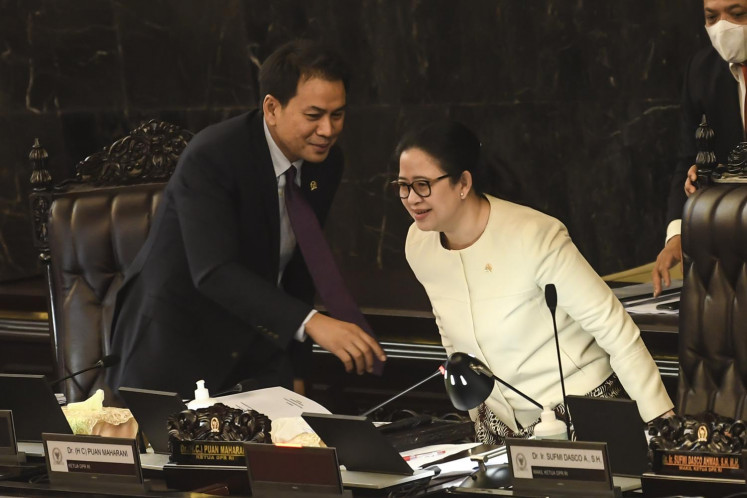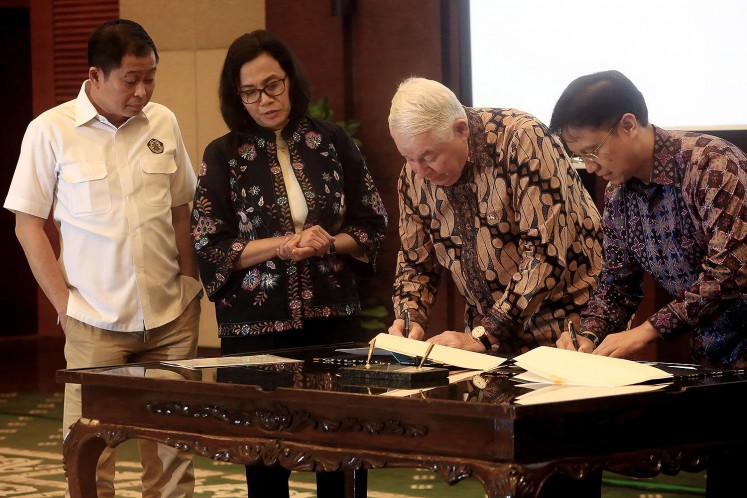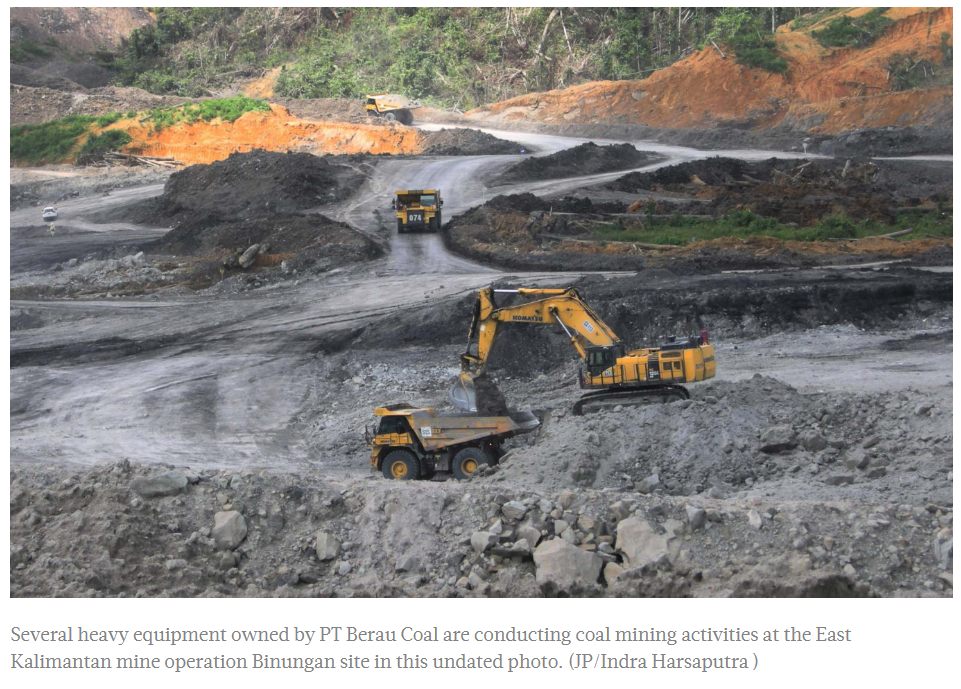Indonesia – Explainer: New rules in revised Mining Law
The House of Representatives passed a revision of the 2009 Coal and Mineral Mining Law on Tuesday in a move criticized by some experts and NGOs over a lack of transparency and alignment with business interests.
The law, jointly drafted by the House and government, seeks to develop the downstream mining industry, grow the economy and create jobs but is deemed to be sidelining the environment, local communities and regional administrations in the process.
“The spirit of this bill is to make all coal and mineral commodities, whether managed by state-owned enterprises or private entities, give returns to the government in the form of added value,” said Energy and Mineral Resources Ministry special advisor Irwandy Arif on April 29.
The law, a copy of which was obtained by The Jakarta Post, mostly revises articles related to mining permits, such as their issuing authority, rights and obligations. A lesser portion of the bill addresses the environment, local communities and the commodity prices.
Here are some key points in the recently passed law:
Expanding mining reserves
Opening new mining territory and ramping up exploration activity are the two ways by which the government plans to grow Indonesia’s coal and mineral reserves.
“Reserves are the soul of our mining industry. No reserves means no activity,” said Irwandy.
The revised law “obligates” miners to explore new reserves every year (Article 36A), whereas the law previously only “allowed” such activity. It even requires miners to allocate an exploration fund (Article 112A) that is subject to further regulation.
Furthermore, the revised law allows miners to explore Indonesian seas (Article 1), whereas the previous law limited offshore activity to 12 kilometers off the coast. The revision is meant to replace depleting onshore tin reserves.
Indonesia is the world’s second-largest producer of tin, a commodity mainly used for soldering, according to the latest US Geological Survey.
Protecting mining giants
The revised law guarantees continued operations for six giant coal miners, whose mining contracts (PKP2B) will expire between 2020 and 2025.
 House of Representatives Speaker Puan Maharani (right) attends a plenary session at the House building in Central Jakarta on Tuesday. (Antara/Muhammad Adimaja)
House of Representatives Speaker Puan Maharani (right) attends a plenary session at the House building in Central Jakarta on Tuesday. (Antara/Muhammad Adimaja)
The revised law says the giants, which have been paying higher royalty rates than regular miners, may continue operations for 20 more years based on special mining permits (Article 169).
“We are certain the bill will provide long-term legal and investment certainty,” said Indonesian Coal Mining Association (APBI) executive director Hendra Sinadia on Tuesday.
Experts have criticized the rule. They said the expiring contracts were the key driver to expediting the legislative process, especially as the coal industry has taken a beating from collapsing coal demand amid the coronavirus pandemic. Coal was Indonesia’s number one export last year.
“There is no urgency except one: saving those six corporations that control 70 percent of national production,” said University of Indonesia economist Faisal Basri in a discussion last month.
Centralizing permit issuance
The authority to issue mining permits is now centralized under the energy ministry (Article 35) instead of under governors and regents to streamline a process that in the past often ran up against bureaucratic hurdles at the regional level.
However, activists have lambasted such a “re-centralization” as defying Indonesia’s 2004 Regional Autonomy Law, which is meant to distribute wealth from Jakarta.
“Regional problems are those of political corruption and law enforcement, not of the vision and philosophy of dividing power between the central government and regions,” said Aryanto Nugroho of mining watchdog Publish What You Pay (PWYP) Indonesia.
In compensation, lawmakers increased the share of mining profits to provinces from 1 percent to 1.5 percent. The share to regencies hosting the mines remains at 2.5 percent, but the share to neighboring regencies was decreased from 2.5 percent to 2 percent.
“We understand if the central government sees a lot of regulatory overlap,” said Regency Administrations Association (APKASI) chairman Abdullah Azwar Anas. “But environmental damage is felt in the regions and we cannot control what is happening on the field.”
APKASI, PWYP, AEER and other civil society organizations say they were never consulted about the new law.
Helping local communities and the environment
Several articles defend the interests of local communities and the environment, but activists say these articles pale compared to those related to mine expansion.
“When mining concessions expand, it means deforestation expands and the surrounding communities are pushed further inland,” said Pius Ginting of environmental watchdog Association of People’s Emancipation and Ecological Action (AEER).
Mining watchdogs have criticized the bill as failing to delineate a mine’s limit, leaving rivers, forests, small islands and natural disaster-prone regions susceptible to degradation.
Nevertheless, the law’s Article 161B states that miners failing to complete land restoration projects face up to Rp 100 billion (US$6.74 million) in fines or five years of imprisonment. Such projects entail restoring vegetation in a mining pit.
The law also obligates miners to allocate funds, the sum of which will be set by the government (Article 108), to empower communities living around a mining concession.
Nationalizing resources
The law tightens the government’s grip over nationally strategic reserves, foreign-owned mining companies and commodity selling prices.
“Coal and mineral resources have to be controlled by the state to ensure optimal, efficient, transparent, sustainable and environmentally-friendly management,” said House member Sugeng Suparwoto on Tuesday.
Lawmakers are giving state-owned enterprises (SOEs) first pick over strategic reserves (Article 75). They also require foreign-owned miners to divest 51 percent ownership to either Indonesia or locally-owned private companies (Article 112). Divesting through the Indonesian Stock Exchange is forbidden.
Lawmakers also enable the government to set coal and mineral selling prices (Article 5). The principle is to balance prices between small metal ore miners and smelting companies as Indonesia bans metal ore exports.
 Bigger share: Freeport-McMoRan Copper & Gold Inc. CEO Richard Adkerson (second right) and PT Indonesia Asahan Aluminium (Inalum) president director Budi Gunadi Sadikin (right) sign a divestment agreement, witnessed by Energy and Mineral Resources Minister Ignasius Jonan (left) and Finance Minister Sri Mulyani in Jakartra on Thursday, July 12, 2018. The government, through Inalum, will have a 51 percent stake in PT Freeport Indonesia following the agreement. JP/Dhoni Setiawan (JP/Dhoni Setiawan)
Bigger share: Freeport-McMoRan Copper & Gold Inc. CEO Richard Adkerson (second right) and PT Indonesia Asahan Aluminium (Inalum) president director Budi Gunadi Sadikin (right) sign a divestment agreement, witnessed by Energy and Mineral Resources Minister Ignasius Jonan (left) and Finance Minister Sri Mulyani in Jakartra on Thursday, July 12, 2018. The government, through Inalum, will have a 51 percent stake in PT Freeport Indonesia following the agreement. JP/Dhoni Setiawan (JP/Dhoni Setiawan)
Indonesia recently seized control over gold and copper miner PT Freeport Indonesia, which had previously been controlled by a US-based company, and is acquiring a controlling stake in nickel miner PT Vale Indonesia.
“A central issue for foreign investors is divestment, because that has a major impact on investment returns in a capital-intensive industry like mining,” American Chamber of Commerce in Indonesia managing director Lin Neumann told The Jakarta Post on Wednesday.
Developing downstream industries
The law introduces incentives for metal ore and coal miners to develop downstream facilities, such as metal smelters and coal-fired power plants, to extract more bang for the buck from Indonesia’s underground wealth.
It guarantees 30-year permits with unlimited renewals (Article 47) for miners integrated with downstream facilities. Nonintegrated miners’ permits are capped at 20 years with two extensions.
However, Djoko Widajanto of the Indonesian Mining Association (IMA) said miners needed even more incentives to develop downstream facilities, as such facilities were capital intensive and required highly skilled laborers.
“Developing processing and refining industries will multiply commodities’ physical value,” he told the Post on Tuesday. “But developing this requires time until reserves are depleted.”
Developing downstream industries was another key reason for revising the law this year, as Indonesia, formerly the world’s top nickel exporter, banned such exports starting this year. A complete ban on exporting metal ore is slated for 2022.
Despite the ban, the law allows miners to continue exporting raw commodities for three years (Article 170A) if the miners are developing or have developed downstream facilities.
The law’s Chapter IVA requires the energy ministry to create, within two years, a five-year downstream industry development roadmap.
Source: https://www.thejakartapost.com/news/2020/05/14/explainer-new-rules-in-revised-mining-law.html


 Thailand
Thailand




